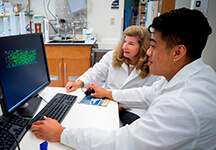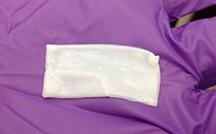Purdue startup's 'building blocks' support research and medical applications
October 20, 2015
 |
|
Sherry Harbin, Purdue University professor of biomedical engineering, and Kevin Buno, graduate assistant, review a 3-D rendering of a vascularized tissue connect in Harbin's laboratory in Purdue's Weldon School of Biomedical Engineering. Harbin founded GeniPhys, a startup based on her research in collagen and engineering matrix technologies. (Purdue Research Foundation photo) |
Company has designed and constructed off-the-shelf tissues and injectable self-assembling tissues
WEST LAFAYETTE, Ind. - A Purdue University startup is developing tissue "building blocks," also referred to as Collymers, that self-assemble to form collagen fibrils resembling those found in the body tissues.
GeniPhys LLC, a startup founded by Purdue researcher Sherry Harbin, is using these "building blocks" along with innovative tissue manufacturing principles for the creation and customization of tissues. These "synthesized" or "engineered" tissues can be used in laboratories to support biological research, drug discovery and toxicity testing. They also can be applied to the body clinically to promote repair and regeneration of damaged or dysfunctional tissues.
"Most laboratory researchers are using plastic dishes to conduct biological research and study cellular behaviors," said Harbin, who is a professor in Purdue's Weldon School of Biomedical Engineering and Department of Basic Medical Sciences. "The problem with this is that living cells will act and react differently when placed on a plastic dish compared to living human tissue. This is a real challenge because it takes years and costs millions of dollars to move an innovative therapy through preclinical and human clinical trials. The ability to better predict early in the product development pipeline how potentially life-saving drugs or devices interface with cells and tissues could yield significant time and cost savings."
Harbin's patented self-assembling Collymers can be used to create customized 3-D tissues and organs outside the body. In fact, this technology has been used in numerous collaborative publications on topics including vessel formation (vasculogenesis), tumor-stromal interactions, and adult human multipotential stem cell guidance to form fat- or bone-like tissues. Her company is currently manufacturing and selling research-grade Collymers and standardized polymerization kits that support creation and customization of 3-D cell culture systems.
 |
|
Pictured is an image of engineered collagen tissue matrix created in the laboratory of Sherry Harbin, Purdue associate professor of biomedical engineering. The engineered collagen polymer "looks like tissue, handles like tissue, and performs like tissue." Since this engineered tissue matrix is designed at the molecular level, it can be customized in terms of geometry, fibril microstructure, mechanical properties and cell-instructive capacity. (Image provided by Sherry Harbin) |
"Such efforts are important as pharmaceutical companies and regulatory agencies look for new, less expensive ways to better predict human outcomes as part of drug development and chemical toxicity testing," she said.
In addition to biological research, these collagen and "engineered" tissues can be used to create next generation tissue-engineered medical products that foster improved tissue integration and regeneration.
GeniPhys also plans to produce medical-grade Collymer products for veterinary and medical applications, including injectable self-assembling tissues, wound and hemostatic dressings, engineered tissue and organ replacements, hybrid medical devices and delivery platforms for therapeutic cells and molecules.
GeniPhys has licensed the innovation through the Purdue Research Foundation Office of Technology Commercialization. More than 20 startups based on Purdue intellectual property were launched in the 2015 fiscal year. Harbin worked with the Purdue Foundry, an entrepreneurial and startup hub in Purdue's Burton D. Morgan Center for Entrepreneurship. A video about GeniPhys is available at https://youtu.be/vMnMSkl3vDI
ASTM International, an organization that develops voluntary consensus standards, recently published the first standard (F3089-14) describing this tunable collagen polymer and collagen-fibril material technology for use in research and medical applications. The development of this consensus standard was spear-headed by Harbin.
About Purdue Foundry
The Purdue Foundry is an entrepreneurship and commercialization hub in Discovery Park's Burton D. Morgan Center for Entrepreneurship. The Purdue Foundry is managed by the Purdue Research Foundation, which received the 2014 Incubator Network of the Year from the National Business Incubation Association for its work in entrepreneurship. For more information about funding and investment opportunities in startups based on a Purdue innovation, contact the Purdue Foundry at foundry@prf.org.
About GeniPhys
GeniPhys is a Purdue University-based startup that specializes in the commercialization of the first standardized, tunable collagen polymers (Collymers) and collagen-fibril materials for research and medical applications.
Writer: Cynthia Sequin, 765-588-3340, casequin@prf.org
Source: Sherry Harbin, 765-496-6128, harbins@purdue.edu

